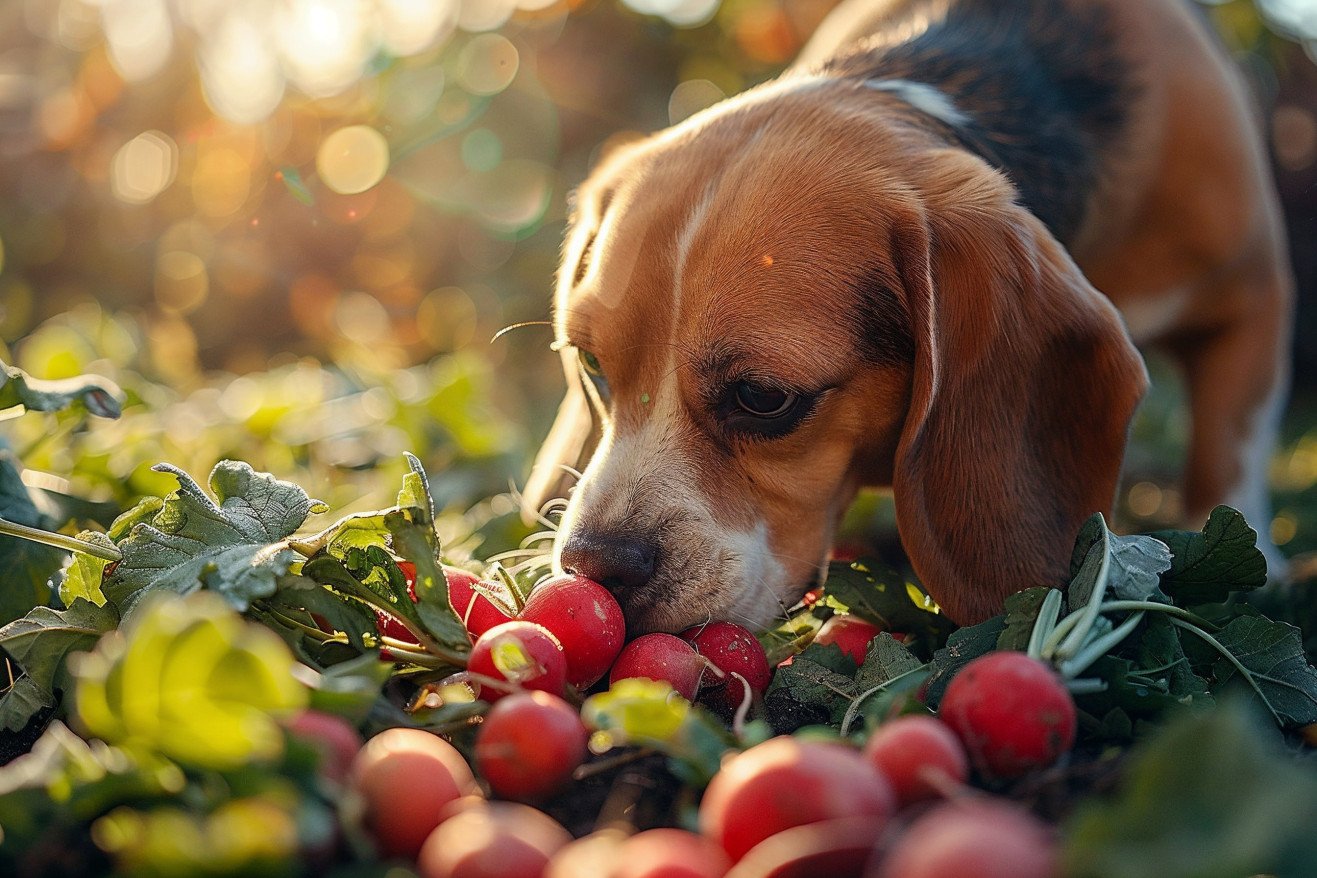Can Dogs Eat Radish? Safety and Nutrition Guide
10 March 2024 • Updated 9 March 2024

You might love the satisfying crunch that radishes add to your salad, but can your dog enjoy them too? The good news is that dogs can eat radishes and they are good for them in small amounts. Not only are they non-toxic, but they also contain fiber, vitamin C, and potassium.
That said, you should only give your dog a few radishes at a time to avoid tummy troubles and make sure to avoid the radish greens, which can be hard for dogs to digest.
To help you better understand what it means to add radishes to your dog’s diet, we’ve referenced veterinarians and nutritional experts to get a comprehensive look at the topic.
In this article, we’ll cover pet nutrition and veterinary science, and we’ll be drawing from scientific studies, expert opinions, and general recommendations for dog nutrition. This will give you the information you need to decide whether or not to give your dog radishes so that you can be confident that you’re meeting their nutritional needs.
Can dogs eat radish?
Radishes: A Healthy, Nutritious Snack
Dogs can eat radishes, which are a healthy, crunchy vegetable that’s full of important nutrients. Radishes are a great source of vitamin C, which helps boost the immune system, and potassium, which is important for proper muscle and nerve function.
Radishes are also a good source of fiber, which is important for digestive health. According to Verywell Fit, a one-cup serving of radish slices has almost 2 grams of fiber and 17 milligrams of vitamin C, which is a significant portion of the daily value.
According to WebMD, radishes are low in calories, with a half-cup serving containing just 9 calories, which means they can be a good choice for dogs that are watching their weight.
However, it’s important to make sure that you’re feeding your dog radishes in a way that’s healthy. Medical News Today explains that while radishes have health benefits, including the ability to lower blood sugar and their antioxidant properties, there are also some potential downsides to consider. For example, consuming too much fiber can cause digestive issues.
In the grand scheme of things, radishes can be a healthy addition to a dog’s diet if they’re fed in moderation. They provide the vitamins and minerals that dogs need without adding a lot of calories. However, if you’re thinking about feeding your dog radishes, it’s important to make sure that you’re weighing the benefits against the potential drawbacks.
Moderation Matters: How to Safely Feed Your Dog Radishes
Although radishes are safe for dogs in moderation, there are some risks to keep in mind. For example, radishes are high in fiber, so overfeeding them to your dog can lead to digestive issues. PetMD also warns that radish leaves can be especially problematic and lead to gastrointestinal upset, vomiting, and diarrhea, so it’s best to avoid them.
It’s important to make sure you’re feeding the right portion size; in general, treats, including radishes, should make up no more than 10 percent of a dog’s daily calories, according to The Dodo. When you first start feeding your dog radishes, make sure to give them a small amount and keep an eye out for side effects, such as changes in their stool.
It’s also important to make sure you’re preparing radishes in a way that makes them safe for your dog to eat. To avoid choking hazards, PetMD recommends washing and cutting radishes into small, bite-sized pieces.
And, as always, make sure to check with your vet before feeding your dog radishes or any other new food to make sure you’re following the best practices. If you do this, you can make sure that radishes can be a part of your dog’s healthy, balanced diet as long as they don’t have any issues with them.
How to Manage Food Allergies in Dogs
In dogs, food allergies are more about proteins and less about the gluten or lactose that humans often have to worry about. VCA Animal Hospitals explains that food allergies in dogs are usually a result of eating the same food for a long time and are most commonly an immune response to proteins in dairy, beef, chicken, eggs, soy, or wheat gluten.
Symptoms of food allergies in dogs can include itchy skin, digestive issues, and even changes in behavior.
Veterinarians diagnose food allergies in dogs with an elimination diet, which is a complex process that’s detailed in a study posted in PMC that requires a food trial that lasts for several weeks and eliminates common allergens. If the symptoms go away and then come back when the suspected food is reintroduced, then the dog has a food allergy.
While radish allergies in dogs are rare, it’s important to be careful when introducing any new food. Make sure to start with small amounts and monitor your dog for any signs of an allergic reaction. PetMD also notes that if you suspect a food allergy, you should work with your vet to come up with a personalized diet plan.
By monitoring your dog’s reaction to new foods like radishes, you can make sure that they stay safe and avoid any uncomfortable or dangerous side effects.
Radishes and Dog Digestive Health
When it comes to dog digestive health, it’s important to remember that adding new foods to your dog’s diet, like radishes, can be a bit of a balancing act. Dogs Naturally Magazine says that vegetables should be a part of a dog’s diet, and they even cite Dr. Ian Billinghurst’s work to show the importance of fiber in a dog’s diet.
Fiber in radishes can help with gut health and regular bowel movements. However, too much fiber can lead to digestive issues like diarrhea and constipation.
To make sure your dog can tolerate radishes, start by feeding them a small amount. This will help you see if your dog has any stomach upset from eating radishes. It’s important to know the signs of stomach upset, which can include gas, bloating, and changes in the consistency of their stool.
If your dog shows any of these signs, you may want to cut back on the amount of radishes you feed them or stop feeding them radishes altogether.
To make sure your dog gets the most out of the digestive health benefits of radishes, Dogs Naturally recommends feeding your dog a variety of vegetables, including crushed or finely chopped radishes. This will help ensure that your dog gets a variety of nutrients from their diet, which can help prevent chronic diseases and support overall gut health.
By paying attention to these signs and adjusting your dog’s diet accordingly, you can make sure that radishes are a healthy addition to your dog’s diet.
In Summary: Can Dogs Have Radishes?
In summary, radishes can be a healthy treat for dogs as long as they are given in moderation. These crunchy root vegetables are packed with important nutrients like fiber, vitamin C, and potassium, all of which can help support a dog’s health. That said, like any treat, radishes should be given in appropriate amounts to prevent digestive issues.
It’s important to reiterate the need for moderation—overfeeding can lead to tummy troubles, and radish greens are definitely off-limits because they can cause digestive problems. Make sure to watch your dog for any signs of an allergic reaction or digestive issues when you introduce radishes, or any new food, into their diet to make sure they are safe and comfortable.
Radishes can be a healthy addition to a well-rounded doggy diet, providing both nutrients and a change of pace. However, it’s important to remember that every dog is different, and what works for one may not work for another. Always talk to your vet to get personalized dietary recommendations for your pet. Taking this comprehensive approach to your dog’s diet will help ensure they stay healthy and happy for years to come.


